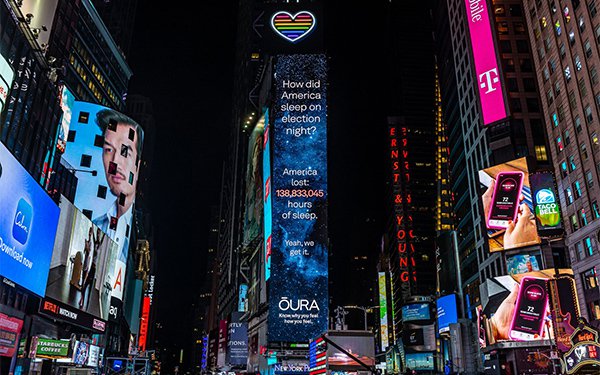
Americans lost 25.2 minutes of sleep on average on
election night, totaling 138,833,045 hours of lost sleep, according to personal health technology wearable, Oura Ring.
“Even with the pandemic changing sleep habits in 2020, the drop in
sleep on election night is fairly substantial,” says Jessica English, vice president of brand at Oura. “It was the largest drop in total sleep time in a single night for the entire
year.”
Hearts were also racing, with an average resting heart rate up 1.4 bpm. There was also a sharp 15% increase in the usage of the “Stress” tag and a 9% increase in
“Anxiety” in the Oura app.
The company and AOR Mischief @ No Fixed Address are now using these insights to launch a digital-out-of-home activation in New York’s Times Square
and across Oura’s social channels.
advertisement
advertisement
The creative is designed to transform the information into easily digestible nuggets that can be understood in seconds, via an online ad or walking by
a digital billboard.
This work was developed in an exceptionally rapid-time frame. Originating as an idea mentioned in a text thread, the entire project was brought to life just four days
later.
“We've never executed a campaign of this magnitude, involving such a significant backing in data, in such a short amount of time,” says English.
While most folk may
have stayed up on Tuesday, for the most part, Americans were well-rested prior to the run-up to the election. The weekend before marked the end of daylight-saving time, with Americans averaging a
score of 80 out of a possible 100 on Oura’s sleep measurement scale. The average in October, by comparison, was 78. (85 or higher is considered “an optimal night of sleep” and 70 to
84 “a good night of sleep.”)
The Oura Ring’s data is taken from readings and measurements from the finger over the capillaries because the company says it provides a more
direct signal than the wrist.
Whether it is a good or bad night of rest, Oura hopes to incorporate upcoming sleeping behaviors into its future creative efforts. We hope this is just the
beginning of how we bring Oura into broader cultural conversations, English says. “With this specific example, we wanted to remind our community of the importance of sleep and to also empathize
with what we know we're all experiencing.”